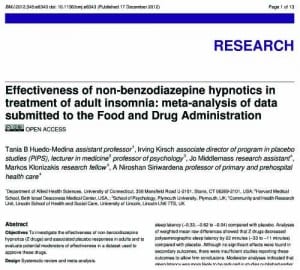A new study from the CaHRU was published online this December 2012. The full paper is available from the link below:
Huedo-Medina T, Kirsch I, Middlemass J, Klonizakis M, Siriwardena AN. Effectiveness of non-benzodiazepine hypnotics in treatment of adult insomnia: meta-analysis of data submitted to the Food and Drug Administration. British Medical Journal 2012; 345: e8343 doi: 10.1136/bmj.e8343.
Newer (Z drug or non-benzodiazepine) sleeping tablets are known to have short term benefits for treatment of insomnia but their effectiveness has been questioned because of publication and reporting bias reported in previous meta-analyses. Publication bias is due to positive trials being more likely to be published and reporting bias is where positive results are more likely to be published in papers. The placebo response contributes a large part of the effect of drugs like antidepressants but we know little about the extent of the placebo response to hypnotics.
This review of data submitted to the FDA showed that Z drugs decreased the time to fall asleep both subjectively and measured in a sleep lab. There was little demonstrable effect on other outcomes, partly because most studies tended not to measure these outcomes such as sleep quality, sleep efficiency, waking during the night after going to sleep, although these outcomes are often more important to patients than time to fall asleep.
There is a lot of debate currently about the lack of data from pharmaceutical industry (‘pharma’) trials to undertake independent analyses. The FDA data provide all pharma data prior to drug approval and are a helpful way of independently evaluating drug effects and side effects. Pharma trials tend to be more positive than non-pharma trials so the effects of studies submitted tend to be an overestimate of the effects of the drugs. Most of the pharma trials included in this meta-analysis were of short duration (up to 30 days) and in people with primary insomnia, not linked to depression or pain.
The drugs had more effect with larger doses, which is not surprising, but also had more effect in younger or female patients and regardless of type of drug, which is more surprising. The drug effect and the placebo response were small and, but the two together produced to a reasonably large response. Around half the effect of the drug was a placebo response, which means the placebo response is important in this type of treatment.
Psychological treatments for insomnia work as well as sleeping tablets in the short term and better in the longer term so focusing on increasing access to these treatments, for example through Resources for Effective Sleep Treatment, would benefit people with sleep problems.

